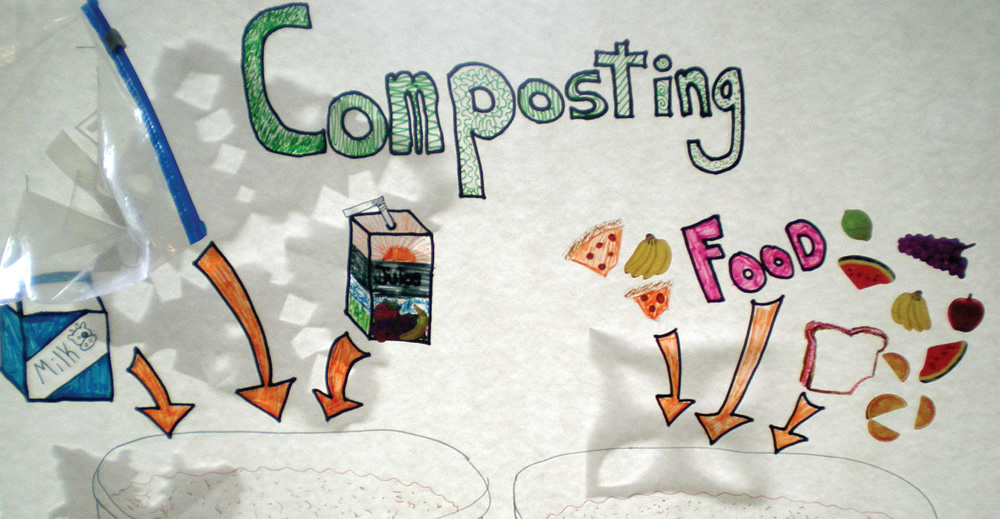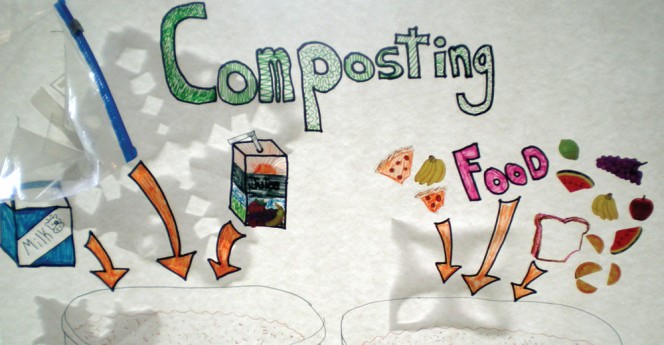Spurred on by Vermont’s Universal Recycling Law, grants were awarded to initiate food scraps composting at schools around the state.
Athena Lee Bradley
BioCycle October 2015
Vermont’s Universal Recycling Law (Act 148) banned recyclables from disposal as of July 2015. Food scraps are being banned as well, beginning with the largest generators in 2014; a full ban, including household food scraps, will be in place by 2020. Vermont schools will be required to comply with the Universal Recycling requirements. Four entities were awarded “Universal Recycling School Grants” from the Vermont Department of Environmental Conservation, Waste Management and Prevention Division (DEC) to assist Vermont schools in implementing recycling and organics diversion programs.
The Northeast Recycling Council, University of Vermont, Northeast Kingdom Waste Management District and Windham Solid Waste Management District each received $11,250 to assist a minimum of four K-12 schools each. While the goal of the grant was to help schools comply with the Universal Recycling Law, the project was also designed to educate the next generation of Vermonters on how easy and important it is to recycle and divert organics.
Steps To School Composting Success
The Northeast Recycling Council (NERC) worked with three schools in southwest Vermont beginning in the fall of 2014: Arlington Memorial High School/Middle School (grades 6-12; 220 students and 45 teachers/staff); Fisher Elementary School, also in Arlington (K-5; 220 students and 50 teachers/staff); and Flood Brook School (K-8; 270 students and 61 teachers/staff) in Londonderry. A fourth school, Monument Elementary in Bennington (K-5; 135 students and 30 teachers/staff) was added in early winter.
Meetings involving key stakeholders were held at each school and included administrators, teachers, custodial and cafeteria staff, and students. Waste assessments were conducted to help establish baseline estimates of waste generation. A school “walk-through” served to document existing waste reduction and recycling programs. NERC also conducted a cafeteria waste audit at each school, collecting and weighing food scraps and soiled paper. The meetings and assessments helped inform the logistics and staffing needs for diverting food scraps.
At each school, results from the waste assessments and audits were compiled to form recommendations for improved recycling. An action plan and a list of needs for successful composting were developed as well. Off-site hauling of food scraps and/or on-site composting options were compared. NERC staff provided resources and technical assistance and training.
Arlington Memorial
Instructors and students with the Arlington Memorial High School Learning Center were responsible for that school’s composting project. The school plans to host a community garden, so staff decided to compost food scraps on-site. Learning Center students monitor cafeteria collection, and built a temporary pallet composting bin on campus to hold the collected materials until a larger, permanent bin could be constructed by the school’s Technology Class.
NERC instructed students about acceptable materials for composting and conducted three trainings on managing the composting process. In spring, the Learning Center instructors and students formed an Environmental Club to engage other interested students to join the composting project. The goal is to continue the Club to ensure that composting gets off to a good start in the new school year.
Fisher
Food scraps collection at Fisher Elementary is supervised by the school’s head custodian, with assistance from enthusiastic student volunteers during each lunch period. The custodian put together a collection system and designed a sign. Collected food scraps are transported to the High School (located across the street) for composting.
Flood Brook
At Flood Brook, NERC helped with the recycling coordinator for the Londonderry Solid Waste Group to implement food scraps composting at the school. Key to the success of cafeteria food scraps collection was support by the school’s principal, facilities director, cafeteria staff and parents. The new composting program was presented at two “all school meetings.” The facilities director constructed a special “compost collection” table to make it easier for students to separate their food scraps.
Parents and community members stepped forward to help train students in separating food scraps during the first month of collection. The Flood Brook cafeteria staff is completely onboard with the school’s composting program, helping to monitor the cafeteria collection bins to ensure that no contaminants are found. At the end of the lunch periods, cafeteria staff deposit the collected food scraps in outside carts and wash the collection buckets. The food scraps are hauled by TAM Organics to its composting facility in Bennington.
Monument
Monument kicked off its food scraps composting program with a school-wide assembly. The school’s principal presented introductory remarks about the new composting opportunity. NERC staff presented a “how to” on recycling and composting at the school, along with a student interactive “Q&A” on what’s recyclable and compostable. A representative from TAM Organics provided an overview of the composting process at its facility.
NERC also provided individual instruction on composting in each of the school’s classrooms, and training to student “compost monitors.” As with Flood Brook, the custodian designed a food scraps collection table. The student monitors and the school custodian assist younger students to ensure program success. Collected scraps are also hauled by TAM Organics.
Funds in the grant were allotted to participating schools to purchase organics collection bins and to pay for hauling services during the school year. In the case of the Arlington schools, funds were used to purchase materials for bin construction and composting equipment.
Saving Money Through Reduction
All the schools participating in NERC’s project had already been using washable trays and silverware for lunch service. Both the Monument and Flood Brook cafeterias use bulk condiment dispensers. Flood Brook in particular, under the direction of the Food Service Director, is to be commended for its commitment to both reducing waste and controlling costs through bulk food purchasing of dried beans, applesauce and other foods.
All items in the Flood Brook school’s salad bar are self-serve and placed directly on lunch trays. Students use a large spoon to dish up applesauce and similar items directly onto their trays. These procedures eliminate use of small plastic disposable bowls or single-serve packaging typically found at other schools.
Other School Composting Projects
The Vermont DEC awarded a grant to the University of Vermont (UVM) to work with Malletts Bay School, Colchester Middle and High Schools, and the Northeast and Northwest Elementary Schools in Rutland, to collect breakfast and lunch food scraps for composting. This unique opportunity brought Dr. Bethany Yon and a team of Nutrition and Food Sciences undergraduate students to Colchester school cafeterias to help students learn the art of separating their food scraps from other recyclables and waste. New sorting stations, with color-coded barrels using Vermont’s Universal Recycling colors and symbols, were constructed with grant funds.
UVM students visited the Colchester elementary and middle school classrooms in December to provide a lesson on the importance of taking care of our environment, followed by a waste sort training at each school. Collected food scraps are hauled by Casella Waste Systems to Green Mountain Compost in Williston, Vermont. The UVM team also documented what students were composting with a goal of future projects to focus on behavior and food choice changes that could help students become more aware of how much food is wasted.
The principal at Northeast Elementary in Rutland came up with the slogan “Pour, Pick and Pound” to help her students figure out what goes where in their new sorting stations. Students now start by “pouring” out any leftover milk into the first bucket, before recycling the empty milk carton in a blue barrel. Students then “pick” off any trash to discard in the trash can. This is followed by “pounding” the lunch trays on the edge of the green compost collection bin to deposit food scraps for composting. Two teachers at Northwest spearheaded the initiative, visiting each classroom with a lesson on “how to sort.”
As part of their community service learning, undergraduate students from the College of St. Joseph helped monitor the programs at the Rutland schools weekly. The College’s Farm Manager and Wellness Assistant is collecting the food scraps and taking them to its composting pile on-campus.
Lessons Learned
Schools with the most success in implementing composting share three key elements: 1) Dedicated individual or team willing to take the lead to ensure that all aspects of food scraps diversion are implemented properly; 2) Full support of school administration; and 3) Full support and upfront involvement of facilities/custodial and cafeteria staff. Other elements critical to success include:
• Initial stakeholder meetings are crucial to gain support and involvement.
• Grant funding for technical assistance, containers and initial hauling expenses was integral in getting school administration involvement in the project.
• Older elementary school students catch on to sorting quickly, but younger students need additional help with separating materials.
• Older students — particularly in high school — may think of themselves as “too cool” to participate. Establishing an environmental club is helpful to get more student buy-in.
• Working with school administrators to help reduce overall costs for waste removal, along with environmental benefits, helps ensure program sustainability.
All schools in the project are now composting five days per week. School food scrap tonnages vary from about 90 pounds/week collected at Arlington Memorial to 250 pounds/week collected at Flood Brook. Grantees worked hard to try to ensure that mechanisms were in place so that the schools could begin food scraps composting in the 2015-2016 school year.
Athena Lee Bradley is Projects Manager at the Northeast Recycling Council, Inc. For more information about Vermont’s Universal Recycling Law, visit www.recycle.vermont.gov.















